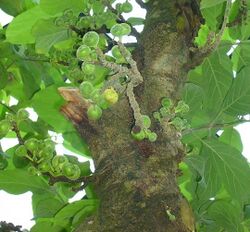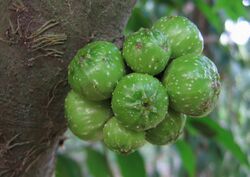Biology:Ficus hispida
| Ficus hispida | |
|---|---|

| |
| Scientific classification | |
| Kingdom: | Plantae |
| Clade: | Tracheophytes |
| Clade: | Angiosperms |
| Clade: | Eudicots |
| Clade: | Rosids |
| Order: | Rosales |
| Family: | Moraceae |
| Genus: | Ficus |
| Subgenus: | F. subg. Sycomorus |
| Species: | F. hispida
|
| Binomial name | |
| Ficus hispida L.f.
| |
| Synonyms | |
|
Ficus oppositifolia Roxb. | |

Ficus hispida also known as the opposite leaf Fig is a small but well distributed species of tropical fig tree. It is morphologically gynodioecious, but functionally dioecious.[2] Male trees are hermaphrodites with both staminate flowers that produce pollen and pistillate flowers that produce almost no seeds but can form galls containing pollinator wasp larvae. Female trees have pistillate flowers that do produce seeds but are inhospitable to pollinator wasp larvae.[3]
It occurs in many parts of Asia and as far south east as Australia .[4][5] There is a large variety of local common names. Like a number of ficus, the leaves are sandpapery to touch. An unusual feature is the figs which hang on long stems.
Species associated with Ficus hispida
In Australia the fruit are eaten by cassowaries and double-eyed fig parrots. Phayre's leaf monkey feeds on the leaves as do the larvae of the moth Melanocercops ficuvorella. The fig wasp Apocrypta bakeri has F. hispida as its host, where it parasitizes the pollinator fig wasp Ceratosolen solmsi. The yet unnamed nematode species Caenorhabditis sp. 35 has been found in Aceh, Indonesia, associated with the tree. Caterpillars of the moth species Asota caricae have been recorded eating F. hispida, the caterpillars skeletonise the leaves.[6]
References
- ↑ Shao, Q.; Zhao, L.; Botanic Gardens Conservation International (BGCI); IUCN SSC Global Tree Specialist Group (2019). "Ficus hispida". IUCN Red List of Threatened Species 2019: e.T147494318A147645751. https://www.iucnredlist.org/species/147494318/147645751. Retrieved 23 January 2023.
- ↑ Dev, Suma A.; Kjellberg, Finn; Hossaert-Mckey, Martine; Borges, Renee M. (2011). "Fine-scale Population Genetic Structure of Two Dioecious Indian Keystone Species, Ficus hispida and Ficus exasperata (Moraceae)". Biotropica 43 (3): 309–316. doi:10.1111/j.1744-7429.2010.00704.x.
- ↑ Miao, Bai-Ge; Liu, Ming-Xin; Wang, Bo; Peng, Yan-Qiong; Lesne, Annick; Kjellberg, Finn; Jandér, K.Charlotte (May 2023). "Active pollination in a functionally dioecious Ficus species: An interplay between pollinator behaviour and floral morphology". Flora (Elsevier B.V.) 302. doi:10.1016/j.flora.2023.152274. https://hal.science/hal-04182812/file/Manuscript%20_Flora_active%20pollination.pdf.
- ↑ "Ficus hispida". ZipcodeZoo. ZipcodeZoo. http://zipcodezoo.com/Plants/F/Ficus_hispida/.
- ↑ "Biotik.org". Ficus hispida. http://www.biotik.org/india/species/f/ficuhisp/ficuhisp_en.html.
- ↑ "Asota caricae". http://lepidoptera.butterflyhouse.com.au/agan/caricae.html.
Wikidata ☰ Q3349206 entry
 |

